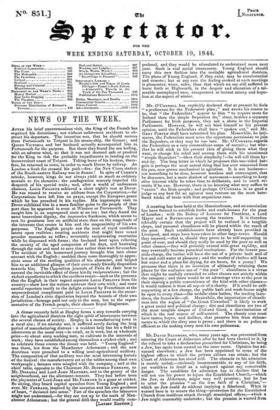A meeting has been held at the Mansionhouse, and an
association has been formed to establish baths and wash-houses for the poor of London ; with the Bishop of LONDON for President, a Lord Mayor and a ROTHSCHILD among the trustees. It is therefore tolerably certain that the project will be realized in a tangible shape, and personal cleanliness will be placed within the reach of the poor. Such establishments have already been provided in Liverpool, and steps have been taken in other large towns. Should they succeed,—that is, should they prove to be self-supporting in point of cost, and should they really be used by the poor as well as other classes,—they will probably extend with great rapidity, and may eventually become parochial institutions. For the lowest pos- sible charge, the bather will have the use of a private bath and of hot and cold water at pleasure ; and the washer of clothes will have hot water and a place for drying, for six hours, for a penny! We presume that there is no intention of ultimately retaining these places for the exclusive use of "the poor " : cleanliness is a virtue that might be usefully extended to other classes not strictly within the category ; and there would be an advantage even to the poor in their sharing a public convenience of the kind with other classes— it would redeem it from all aspect of a charity. If it could be self- supporting at a low charge, the public bath and wash-house might be open to every class—the middle-class bather, the trading laun- dress, the housewife—all. Meanwhile, the importation of cleanli- ness into the region of "the Great Unwashed" is likely to work a great social and political change : dirt and cleanliness are two of the most tangible shapes of Evil and Good, a discrimination of which is the real source of self-control. The cleanly man must have tastes, hopes, and dislikes, that preserve him from debase- ments to which the dirty man is prone ; and there is no police so efficient as the making every man his own policeman.


























